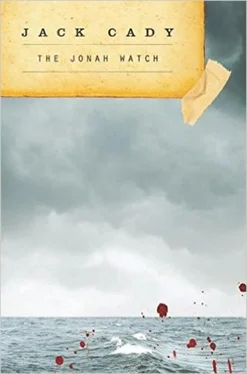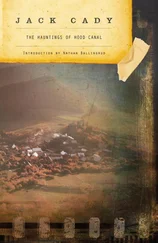Jack Cady
THE JONAH WATCH
For Carol, a fellow historian
So Jonah Arose, and Went Unto Nineveh,
According to the Word of the Lord.
—Jonah 3:3
This tale remembers the cutters Yankton and Legare , and the men who sailed them. Experienced seamen who recall the early 1950s, which is the setting for this story, will see that the Coast Guard cutter Adrian is a conglomerate of the 125-foot and 110-foot classes.
As to the spectral, other-worldly nature of what follows: I never saw a Coast Guard log doctored, but I have seen events that were deliberately omitted. Each incident in this story actually occurred in one form or another. The ghost of Jensen (a fictional name) appeared climbing the ladder to the bridge of a neighboring cutter on more than one occasion. The incident of the Hester C. (another fictional name) is a matter of record, although the spectral manifestation that accompanied it is not. I have no explanation for these events, nor seek any. They happened. I witnessed them while in a state of sobriety when I am firmly convinced I was not crazy.
All other events are a matter of official record, whether they be six downed airmen, or a terrible case of epilepsy. In the cause of fiction it has been necessary to change the tactical disposition of cutters, while names of vessels towed are entirely fictional. However, the names are common to that coast. Here and there they may accidentally match the name of a real vessel.
Like the ship, the crew is a conglomerate of characteristics observed among hundreds of seamen. The exceptions are Masters and Racca. No doubt there are plenty of men on that coast who have no courage, but this writer has met only one. His name was quite a common name, and he was old and tired and failing in the business of fishing. In his younger days, it was said of him that he had been brave.
Last, this book is an exercise in total recall. It took a year to write, but the only research material needed was a chart of the coast. In a way the book took more than a year. I first tried it in ’61, then in ’69, then in ’73, and finally wrote it in 1980. I left the Coast Guard in ’56. It took twenty-four years to gather enough skill and objectivity to tell the story. My admiration for those unsung men who save life at sea was so great that sentiment blocked the earlier attempts.
On those far northern shores where the wind sets north-northeast, and where remote lighthouses are haunted by dark tales of men flung upright from the surf—as if the dead rose through spray like pathetic divines—the summer slides in on the memory of ice. Sunlight polishes the luminous green of the outer islands. Old men unprop their feet from crackling wood stoves. They stop their winter yarning; stretch, turn weathered faces to the sun. Brick streets glisten with melt from high-piled banks and stockades and walls of snow. Young men blink fantastically in the sun. Their downcast, high-bowed vessels no longer plunge doubled up on the moorings. The young men hunger and begin to laugh. They seem strangely unamazed to be alive.
The summer shuffle begins. There is a last-minute rearrangement of crews aboard the trawlers. Nets repaired during winter and deemed “twill do” seem old and fragile in the sun. The ships’ chandlers enjoy a surge of business, dealing almost lustily in the perfume of manila, of tarred marlin, of enameled boxes of electronics designed to aid in the taking of fish. To the east the swells bat down and the North Atlantic settles promissory toward the tranquility of summer. On the white ships, arc welders sputter against winter damage. Here and there a new face appears, a new set of hands, a new body to be groomed and trained and then thrown against the inevitability of September.
Ernie Brace came aboard on a day that surrounded the cutter Adrian with the over-flooding certainty of sunlight. The tide was full and the gangway taut, for the tidal fall in those waters is great. When the tide was at half, the gangway pointed straight across from ship to pier. It gave rattles like the clank of pans being beaten by chains. At full tide the gangway pinged like a drumhead telegraphing the uncertainty of Brace’s steps. He moved like any other seaman deuce sprung high schooled and timid from the fields and small towns of Indiana or Kansas. His fresh seabag was glazed white in the sun. It hung stiff over a narrow shoulder that leaned with its weight. Brace’s slender body was clad in issue blues, like a brushed and newly blocked sack from which popped his unremarkable-appearing, brown-haired head—a head, some supposed, that was stuffed with young arrogance which the man would not lose until he had survived some heavy weather.
He was new to the ship, but he represented nothing new. They come and go, these young ones, like confused cherubs or corn-fed angels ashore in Rome. Plunking untraveled seabags to the quarterdeck, they cause small ripples as they enter the community of the ship, only to soon leave with no trace of a wake. They go to service schools or by draft to weather cutters. They are great requesters of transfers—or were.
Yet, it does not seem long ago. We were all rougher then, as we are certainly smoother now. Those who are not sandpapered flat.
The sea is the same, and the brawling northeastern ports remain. The narrow white Coast Guard ships churn white froth as they appear and disappear like phantoms into shrouds of mist. These new ones are bright with bold red stripes on their bows and with commission pennants snapping from stubby masts; yet, they hold a hint of other ships. They tell a subdued vision of converted subchaser hulls made awkward by high boxlike deckhouses. Short fantails disappear into a winter fog of memory, but yes—the sea is the same. Mist and the sparkle of the sun turned dull on polished bronze, and always, finally, the ice fog and ash-gray light of winter. What seems a tale of the wind is really a tale of ice and the mist.
Brace blinked in that sun and looked at his first assignment. Confused. His mouth was not naturally large and now it was tight. His dark eyes were more fearful than timid. It must have seemed to him that he had been sent to the very belly of chaos.
Beneath his hand a rail twisted away; the round, solid steel grotesquely bent like half a question. Before his eyes, a second rail twisted downward from the boat deck. Foundations, where gear lockers once stood, looked like an erect tumble of steel shrubbery, while the lockers themselves, as Brace would discover, were taking a swim off Georges Bank. Cutter Adrian was poxed with spots of red lead over newly cleaned steel. The house was streaked with rusty slashes of new welds that bled toward the deck. On the boat deck beside twisted and empty davits two seamen stopped their work, nudged each other, laughed; winked like a couple engaged in an extravagant romance. They waited for chief bosun Dane to appear, stubby legged and bawling. On the fantail the yeoman, Howard, nursed a light hangover and checked a requisition of stores. He bit at the end of a yellow pencil and rubbed his aching, dark-haired head. Through the open midship hatch sounded the curse of an engineman and the rattle of chain falls. The radio made desultory pops from the bridge. The steward Amon scampered aft… stopped; his olive Hawaiian face managed to look bland and incredulous at the same time.
“New man?”
“Brace. Where should I go?”
Читать дальше













